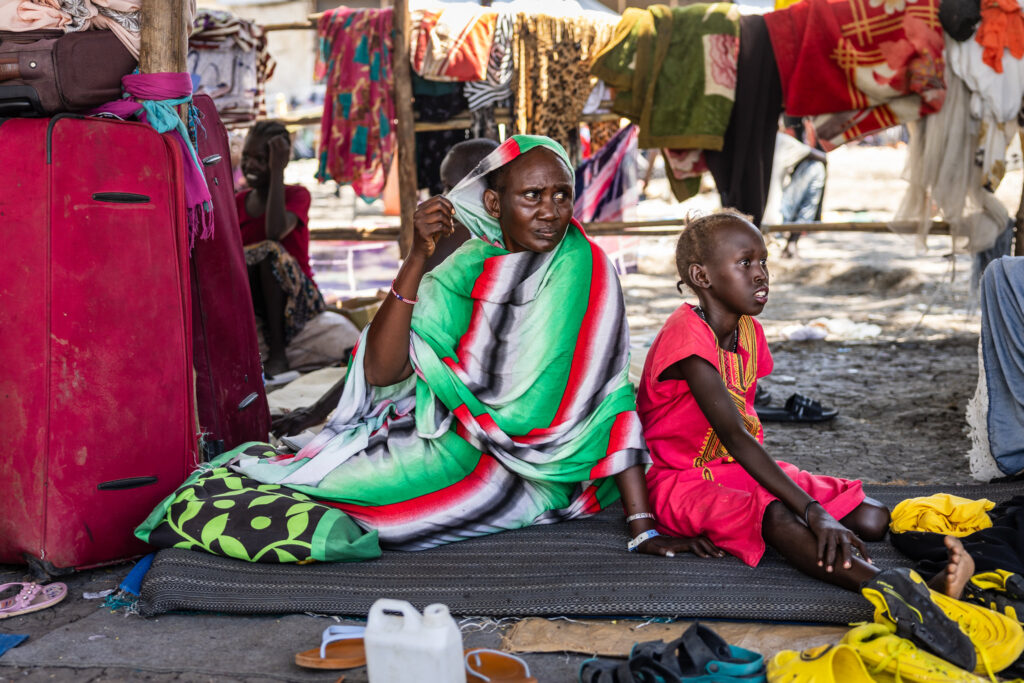One year on, the war in Sudan is spiralling out of control: “The conflict needs a political solution”
The rival factions need to realise that there is no military solution to the conflict, say CMI’s new advisors Nicholas Kay and Amir Salim. CMI supports the Sudanese civilians in making their demands heard.

Sudanese refugees in the town of Malakal, in South Sudan’s Upper Nile state, in September 2023. Tens of thousands of Sudanese fleeing the crisis have sought shelter in the town. Photo: Gregório Cunha/UNMISS
The war in Sudan erupted on 15 April 2023, when a power struggle between two rival factions of the military government turned into an open conflict. Two generals, the head of the Sudanese army, Abdel Fattah al-Burhan, and the leader of the Rapid Support Forces (RSF), Mohamed Hamdan “Hemedti” Dagalo, were at loggerheads.
One year on, the war has had a devastating impact amid international inattention and inaction. Tens of thousands have been killed. The humanitarian crisis is worsening, with the threat of famine looming.
In 2024, one in two people in Sudan (24,8 million people) will need humanitarian assistance, according to the UN Office for the Coordination of Humanitarian Affairs (OCHA). According to the UN refugee agency UNHCR, the ongoing fighting has displaced more than 8.5 million people: some 6.5 million are internally displaced. UN experts estimate that Sudan is experiencing the world’s largest internal displacement crisis.
The war has been deliberately de-prioritised by the international community in favour of other interests, says CMI’s new Senior Advisor on Sudan, Sir Nicholas Kay. “It is shocking that the war has been forgotten or ignored like this, because the scale of human suffering in Sudan is immense.” Kay is a retired diplomat who served as British ambassador to Sudan.
Both Kay and Amir Salim, CMI’s new advisor on Sudan, say that the risk of a wider conflict outside the country’s borders is very real as the war continues. The conflict has spread to new geographical areas within Sudan and is increasingly becoming an ethnic war, pitting different groups against each other. Neighboring countries and external powers are supporting different sides in the conflict. “External actors have been playing a major role in prolonging the conflict, and this needs to be addressed”, says Salim, who previously worked with the UN’s political mission in Sudan, UNITAMS.
Sudan is strategically located in a volatile region. “What happens in Sudan could easily spill over or affect other countries. The ongoing war constitutes a credible threat to the wider regional stability ”, says Salim.
The competing interests of external powers are hampering peace efforts. A unified international push to end the fighting is still lacking. But there are signs that a more concerted effort is taking shape, says Kay. The US, the UN, the African Union and the regional organisation IGAD have all appointed new envoys for their peace efforts.
Unfortunately diplomacy can only go so far at this point, says Kay. “As long as the parties feel they can crush the other side and come out victorious, it is going to be very difficult to put an end to this war.”
Without civilians, there can be no sustainable peace
The parties need to realise that there is no military solution to the conflict, Kay and Salim stress. “This is a political war, and it needs a political solution.” While official peace efforts are focused on achieving a durable ceasefire in the first place, informal diplomacy is paving the way for a political solution. A key aspect of this political solution is Sudan’s future as a civilian-led state rather than a military one. In October 2021, the Sudanese military, which is now fighting among itself, halted the country’s democratic transition by overthrowing the civilian government. “Part of the political solution to the war is to increase civilian ownership of the country. Therefore, there is much effort to support the work of civilian actors to ensure that their voices and demands are heard in any eventual peace agreement.”
CMI facilitates dialogue between different civilian groups, such as political parties, civil society activists or trade unions, in order to strengthen their currently marginalised role. The ultimate goal is to help civilians develop a shared vision for their country. “Otherwise it is too easy for the military to divide and rule between the civilians”, says Kay. Discussions among civilians include the future role of different state institutions and the distribution of power within the country.
Strong local ownership is also at the heart of CMI’s work in Sudan. The Sudanese are in charge of the dialogue, and CMI only facilitates it when necessary. Kay also stresses CMI’s impartiality. “We will work with and talk to all parties to the conflict if it is in the interest of building peace.”
Without civilians, there can be no sustainable peace in Sudan, CMI advisors point out. “Civilians need to be in the driving seat. Otherwise, the war will return.”
Antti Ämmälä/CMI